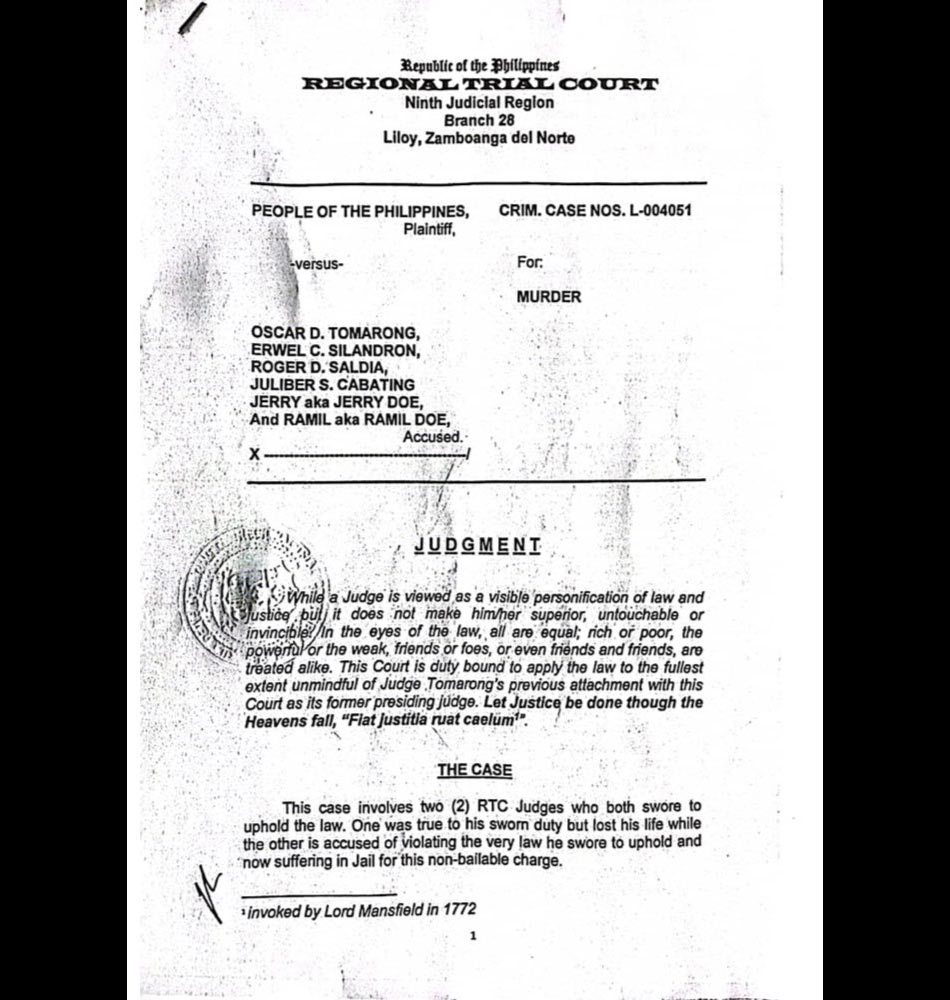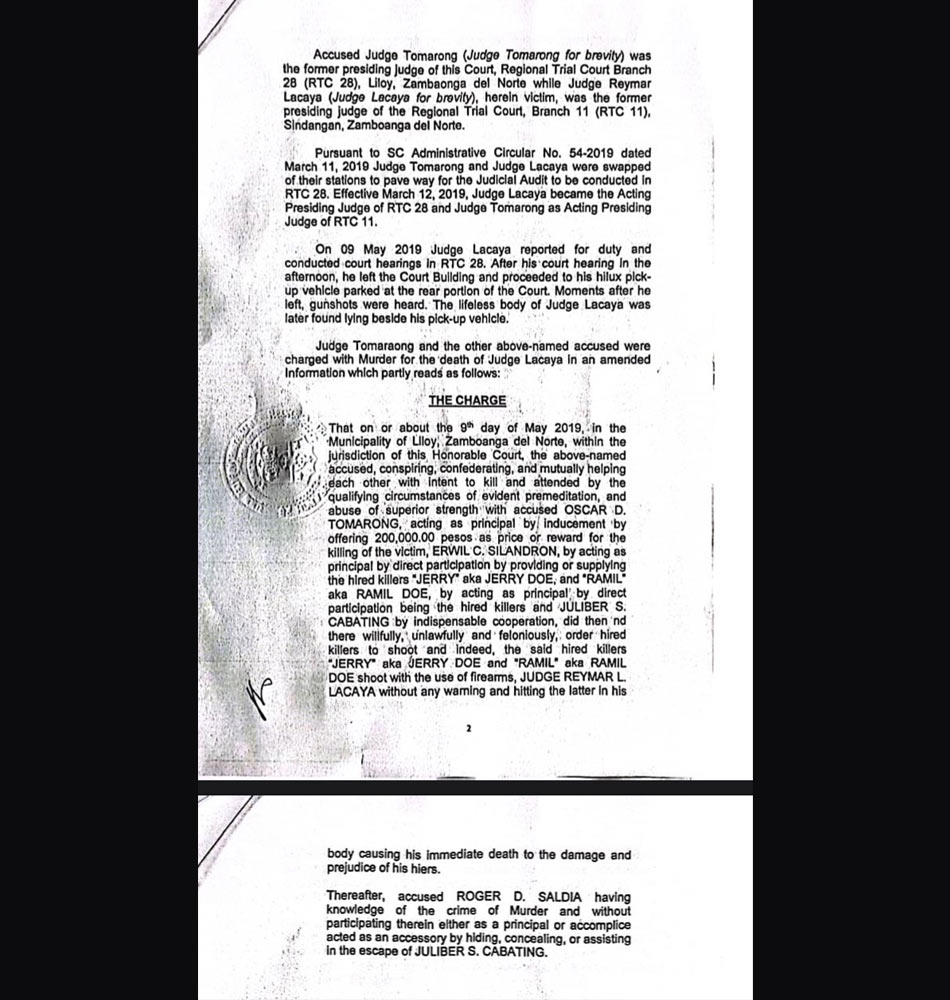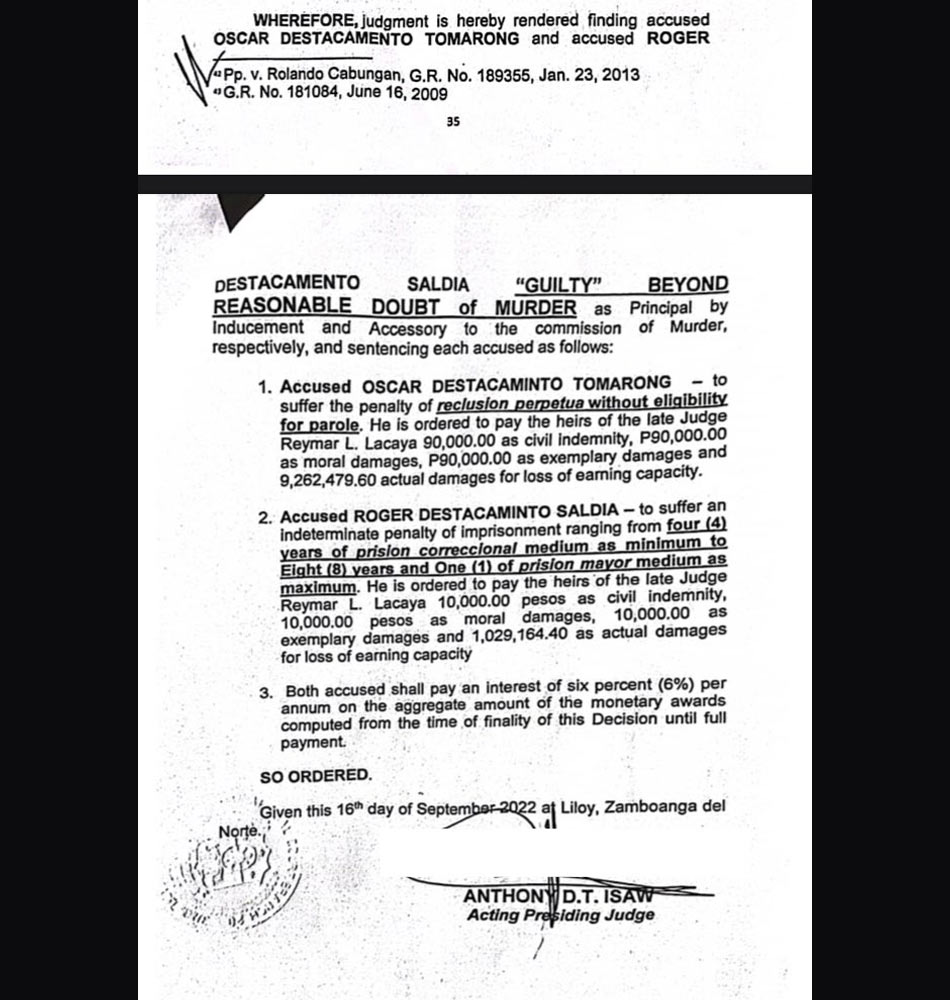Retired Zamboanga judge convicted for another judge's murder | ABS-CBN

Welcome, Kapamilya! We use cookies to improve your browsing experience. Continuing to use this site means you agree to our use of cookies. Tell me more!
Retired Zamboanga judge convicted for another judge's murder
Retired Zamboanga judge convicted for another judge's murder
Mike Navallo and Dynah Diestro,
ABS-CBN News
Published Oct 07, 2022 10:04 PM PHT
|
Updated Oct 07, 2022 11:23 PM PHT
Hired killers still at large
Hired killers still at large
MANILA — A Zamboanga del Norte court has convicted a retired judge of murder for ordering the 2019 killing of a fellow judge right within the court’s compound.
MANILA — A Zamboanga del Norte court has convicted a retired judge of murder for ordering the 2019 killing of a fellow judge right within the court’s compound.
In a judgment dated September 16, Liloy, Zamboanga del Norte Regional Trial Court Branch 28 sentenced retired Judge Oscar Tomarong to reclusion perpetua or up to 40 years in prison without eligibility for parole for the death of Judge Reymar Lacaya.
In a judgment dated September 16, Liloy, Zamboanga del Norte Regional Trial Court Branch 28 sentenced retired Judge Oscar Tomarong to reclusion perpetua or up to 40 years in prison without eligibility for parole for the death of Judge Reymar Lacaya.
He was also ordered to pay the heirs of the late judge more than P9.5 million in civil indemnity and damages, including loss of earning capacity.
He was also ordered to pay the heirs of the late judge more than P9.5 million in civil indemnity and damages, including loss of earning capacity.
WHAT HAPPENED?
Tomarong was the former presiding judge of the same court that convicted him while Lacaya presided over Sindangan, Zamboanga del Norte RTC Branch 11.
Tomarong was the former presiding judge of the same court that convicted him while Lacaya presided over Sindangan, Zamboanga del Norte RTC Branch 11.
ADVERTISEMENT
In March 2019, the Supreme Court ordered the 2 judges to swap places to make way for a judicial audit.
In March 2019, the Supreme Court ordered the 2 judges to swap places to make way for a judicial audit.
On May 9, 2019, two hired killers shot dead Lacaya as he was about to board his vehicle after a hearing.
On May 9, 2019, two hired killers shot dead Lacaya as he was about to board his vehicle after a hearing.
The Zamboanga court found out that Tomarong, through two intermediaries, paid the two killers P200,000 to kill Lacaya.
The Zamboanga court found out that Tomarong, through two intermediaries, paid the two killers P200,000 to kill Lacaya.
The conviction was based mainly on the extrajudicial confession of one of the 2 intermediaries, Juliber Cabating, who worked as Tomarong’s aide.
The conviction was based mainly on the extrajudicial confession of one of the 2 intermediaries, Juliber Cabating, who worked as Tomarong’s aide.
Cabating claimed that the judge asked him to look for killers to kill Lacaya because he was allegedly fed up (“napuno na ko”) with the slain judge.
Cabating claimed that the judge asked him to look for killers to kill Lacaya because he was allegedly fed up (“napuno na ko”) with the slain judge.
Before Lacaya’s killing, Cabating said he was also tasked to hire a killer to kill a woman that Tomarong blamed for providing his live-in partner with a new boyfriend.
Before Lacaya’s killing, Cabating said he was also tasked to hire a killer to kill a woman that Tomarong blamed for providing his live-in partner with a new boyfriend.
He added that Tomarong himself handed over to him the payment for the hired killers.
He added that Tomarong himself handed over to him the payment for the hired killers.
Lacaya’s wife also testified in court that Lacaya confided in having problems with Tomarong’s cases and supposedly said Tomarong will certainly get mad at him a few days before he was killed.
Lacaya’s wife also testified in court that Lacaya confided in having problems with Tomarong’s cases and supposedly said Tomarong will certainly get mad at him a few days before he was killed.
Judge Anthony Isaw, the acting presiding judge of Zamboanga RTC Branch 28, found Cabating’s testimony “sufficient and competent” to prove that it was Tomarong who masterminded the killing.
Judge Anthony Isaw, the acting presiding judge of Zamboanga RTC Branch 28, found Cabating’s testimony “sufficient and competent” to prove that it was Tomarong who masterminded the killing.
“As the mastermind, he directly induced the hired killers, a certain Jerry and Ramil to commit the murder of Judge Lacaya. His inducement of them was not merely casual but influential and controlling due to the huge amount involved as price or reward for the killing of Judge Lacaya,” he said.
“As the mastermind, he directly induced the hired killers, a certain Jerry and Ramil to commit the murder of Judge Lacaya. His inducement of them was not merely casual but influential and controlling due to the huge amount involved as price or reward for the killing of Judge Lacaya,” he said.
The other intermediary, Erwil Silandron, and the 2 killers, who were only identified as “Jerry” and “Ramil,” are still at large.
The other intermediary, Erwil Silandron, and the 2 killers, who were only identified as “Jerry” and “Ramil,” are still at large.
A fifth accused, Roger Saldia, who had been allowed to post bail, was sentenced to up to 8 years in prison for hiding Cabating while he was still on the run.
A fifth accused, Roger Saldia, who had been allowed to post bail, was sentenced to up to 8 years in prison for hiding Cabating while he was still on the run.
He was also ordered to pay more than a million pesos in damages and civil indemnity to Lacaya’s family.
He was also ordered to pay more than a million pesos in damages and civil indemnity to Lacaya’s family.
TOMARONG’S DEFENSE
Tomarong tried to distance himself from Cabating by claiming he is not a trusted employee but the court noted Cabating called him “boss” and did errands for him — from cleaning the court and doing the laundry to cooking dinner.
Tomarong tried to distance himself from Cabating by claiming he is not a trusted employee but the court noted Cabating called him “boss” and did errands for him — from cleaning the court and doing the laundry to cooking dinner.
Tomarong also had some influence on Cabating’s contractual work with the Department of Public Works and Highways, the court found.
Tomarong also had some influence on Cabating’s contractual work with the Department of Public Works and Highways, the court found.
“Clearly, his fear of losing his job which he holds for more than six (6) years moves Cabating to submit to the will of Judge Tomarong as a show of loyalty, faith, and gratitude to the latter. This Court reasonably concludes and adopts as a finding that Judge Tomarong’s moral dominance over Cabating is the determining cause why Cabating performed his role, lawful or unlawful, according to the wishes of his boss, accused Judge Tomarong. This lends credence to the declaration of Cabating that he acted for Judge Tomarong when he looked for hired killers to kill Judge Lacaya,” the court said.
“Clearly, his fear of losing his job which he holds for more than six (6) years moves Cabating to submit to the will of Judge Tomarong as a show of loyalty, faith, and gratitude to the latter. This Court reasonably concludes and adopts as a finding that Judge Tomarong’s moral dominance over Cabating is the determining cause why Cabating performed his role, lawful or unlawful, according to the wishes of his boss, accused Judge Tomarong. This lends credence to the declaration of Cabating that he acted for Judge Tomarong when he looked for hired killers to kill Judge Lacaya,” the court said.
Although Tomarong was not present during the killing, the court said “one who induces another to commit a crime is guilty as principal even though he might have taken no part in its material execution.”
Although Tomarong was not present during the killing, the court said “one who induces another to commit a crime is guilty as principal even though he might have taken no part in its material execution.”
While there were no witnesses who saw the 2 hired killers shoot Lacaya, the court said there were enough circumstantial evidence to prove that “Ramil and Jerry” killed the judge:
While there were no witnesses who saw the 2 hired killers shoot Lacaya, the court said there were enough circumstantial evidence to prove that “Ramil and Jerry” killed the judge:
- They were spotted with Cabating a few hours before the killing.
- They were also seen on CCTV footage entering the court premises.
- They were seen running away from the court compound.
- Three witnesses, including Cabating, identified them to be the same persons on the CCTV footage.
- They were spotted with Cabating a few hours before the killing.
- They were also seen on CCTV footage entering the court premises.
- They were seen running away from the court compound.
- Three witnesses, including Cabating, identified them to be the same persons on the CCTV footage.
Apart from finding conspiracy among the accused, the court also ruled the killing amounted to murder as it was premeditated and done with treachery and in consideration of a price, reward or promise. Either one of the 3 circumstances could qualify a killing to murder.
Apart from finding conspiracy among the accused, the court also ruled the killing amounted to murder as it was premeditated and done with treachery and in consideration of a price, reward or promise. Either one of the 3 circumstances could qualify a killing to murder.
Tomarong surrendered to the National Bureau of Investigation in Dipolog in October 2020 and was not allowed to post bail.
Tomarong surrendered to the National Bureau of Investigation in Dipolog in October 2020 and was not allowed to post bail.
In convicting Tomarong, Judge Isaw noted the irony of the case before him.
In convicting Tomarong, Judge Isaw noted the irony of the case before him.
“This case involves two (2) RTC Judges who both swore to uphold the law. One was true to his sworn duty but lost his life while the other is accused of violating the very law he swore to uphold and now suffering in Jail for this non-bailable charge,” he said.
“This case involves two (2) RTC Judges who both swore to uphold the law. One was true to his sworn duty but lost his life while the other is accused of violating the very law he swore to uphold and now suffering in Jail for this non-bailable charge,” he said.
“While a Judge is viewed as a visible personification of law and justice, but it does not make him/her superior, untouchable or invincible. In the eyes of the law, all are equal; rich or poor, the powerful or the weak, friends or foes, or even friends and friends, are treated alike. This Court is bound to apply the law to the fullest extent unmindful of Judge Tomarong’s previous attachment with this Court as its former presiding judge. Let Justice be done though the Heavens fall, ‘Fiat justiitia ruat caelum’,” he added.
“While a Judge is viewed as a visible personification of law and justice, but it does not make him/her superior, untouchable or invincible. In the eyes of the law, all are equal; rich or poor, the powerful or the weak, friends or foes, or even friends and friends, are treated alike. This Court is bound to apply the law to the fullest extent unmindful of Judge Tomarong’s previous attachment with this Court as its former presiding judge. Let Justice be done though the Heavens fall, ‘Fiat justiitia ruat caelum’,” he added.
SAFETY OF JUDGES
Lacaya’s killing in 2019 was part of a series of killings of judges that alarmed the judiciary.
Lacaya’s killing in 2019 was part of a series of killings of judges that alarmed the judiciary.
In November that year, Ilocos Sur RTC Judge Mario Anacleto Bañez was shot dead by unidentified gunmen on board a motorcycle while inside his car and on the way home in San Fernando, La Union.
In November that year, Ilocos Sur RTC Judge Mario Anacleto Bañez was shot dead by unidentified gunmen on board a motorcycle while inside his car and on the way home in San Fernando, La Union.
At that time, the Supreme Court’s Office of the Court Administrator listed 31 judges killed since January 1999, prompting calls from judges for the passage of a law that will create a Philippine marshals system that will safeguard judges.
At that time, the Supreme Court’s Office of the Court Administrator listed 31 judges killed since January 1999, prompting calls from judges for the passage of a law that will create a Philippine marshals system that will safeguard judges.
A law creating the Office of the Judiciary Marshals was eventually passed in 2022 although its implementing rules and regulations are still being drafted.
A law creating the Office of the Judiciary Marshals was eventually passed in 2022 although its implementing rules and regulations are still being drafted.
But other attacks against judges have surfaced since then.
But other attacks against judges have surfaced since then.
In March last year, Mandaluyong RTC Judge Monique Quisumbing-Ignacio was red-tagged in 2 tarpaulins along EDSA after she junked illegal possession of firearms and explosives cases against journalist Lady Ann Salem and unionist Rodrigo Esparago.
In March last year, Mandaluyong RTC Judge Monique Quisumbing-Ignacio was red-tagged in 2 tarpaulins along EDSA after she junked illegal possession of firearms and explosives cases against journalist Lady Ann Salem and unionist Rodrigo Esparago.
In a rare move, the Supreme Court issued a strongly-worded statement shortly after, condemning threats against judges and lawyers.
In a rare move, the Supreme Court issued a strongly-worded statement shortly after, condemning threats against judges and lawyers.
In September this year, the high court also acted swiftly in warning against social media statements threatening the safety of judges, after former anti-insurgency task force spokesperson Lorraine Badoy posed a “veiled threat” against Manila RTC Judge Marlo Magdoza-Malagar.
In September this year, the high court also acted swiftly in warning against social media statements threatening the safety of judges, after former anti-insurgency task force spokesperson Lorraine Badoy posed a “veiled threat” against Manila RTC Judge Marlo Magdoza-Malagar.
Malagar had junked the Department of Justice’s proscription case against rebel groups Communist Party of the Philippines (CPP) and its armed wing the New People’s Army (NPA).
Malagar had junked the Department of Justice’s proscription case against rebel groups Communist Party of the Philippines (CPP) and its armed wing the New People’s Army (NPA).
Badoy has denied threatening the judge and blamed the media and the CPP-NPA for supposedly twisting her statement.
Badoy has denied threatening the judge and blamed the media and the CPP-NPA for supposedly twisting her statement.
Several groups urged SC to cite Badoy in contempt of court. A petition has been filed.
Several groups urged SC to cite Badoy in contempt of court. A petition has been filed.
On Tuesday, the high court required Badoy to explain why she should not be penalized for her statements.
On Tuesday, the high court required Badoy to explain why she should not be penalized for her statements.
Read More:
Supreme Court
Sindangan
Zamboanga del Norte
judge
judge killing judge
Oscar Tomarong
Reymar Lacaya
ADVERTISEMENT
ADVERTISEMENT




